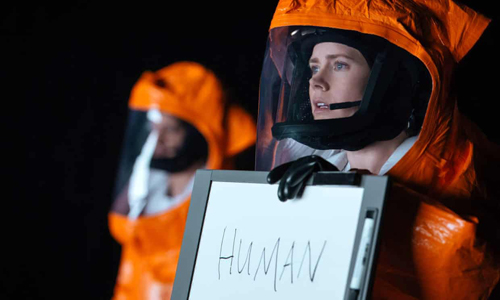
Your complimentary articles
You’ve read one of your four complimentary articles for this month.
You can read four articles free per month. To have complete access to the thousands of philosophy articles on this site, please
Films
Arrival
Christopher Carroll asks if communicating with aliens really would be possible.
In Arrival (2016), a number of large oval craft arrive on Earth from outer space. Rather than follow the hysteria of a planet coming to terms with its first encounter with aliens, as is a frequent trope of films with this sort of premise, the movie follows a linguist who works as part of a team tasked with figuring out how to communicate with these visitors from another world. She’s picked up in the middle of the night and taken by helicopter to a military campsite near where one of the spacecraft hovers. Military personnel, intelligence personnel, and scientists are already working there, and monitoring the progress of those working at similar sites around the world. After a number of breakthroughs in communicating with the aliens, the sharing of information between the global sites breaks down as the movie shifts to the question of what the aliens really are here to do: Are their intentions hostile and linked to a desire to divide and conquer, or are they here for some other reason? The plot thickens into an interesting conclusion I will not spoil for those who have not seen the film yet.
What makes Arrival unique is how the task of communicating with extraterrestrials is at its core, rather than sidelined or avoided. Too many first contact classics, such as Independence Day (1996), avoid the question of communication altogether, leaving those with their thinking caps on confused about how plot twists such as a computer virus infecting an alien mothership (as is the climax of Independence Day) are meant to work. There’s plenty of sci fi material where the task of establishing interspecies communication is treated as almost magic – much like the Babel Fish in The Hitch-Hiker’s Guide to the Galaxy, which you stick in your ear and it translates all alien languages for you. An explanation of how the aliens knew human language was not discussed at all in The Day the Earth Stood Still, neither in the 2008 remake nor the 1951 classic. By contrast, Arrival goes straight to questions like “Should human languages be introduced to the alien visitors in both written and audio form?” And “Would this make their task of understanding us more complicated or easier?” Using theories of language acquisition, the linguist, Louise Banks (Amy Adams) argues to her superior in military uniform (Forest Whitaker) that human language (specifically, American English) should be introduced in both written and audio form. But an interesting question is brought to the surface here: is the task of communicating with aliens even possible? Contrary to what Arrival suggests, I think not.

What could it mean?
Film images © Paramount Pictures 2016
The Problem Goes Deeper
One assumption we would probably be wise to make when encountering extraterrestrials is that they will have had a biological history which will have played a major role in how they evolved to think and speak. Whatever this history was, the capacity for using and understanding language is likely to be hard-wired into them, much like it is for us. This would give their thought and speech specific capacities and limitations, just as it does for us.
The nature of the aliens’ intelligence and of their ability to communicate will have been generally shaped by their evolutionary history. First, it seems very generous for us to presume that learning a language in audio and/or written form will be something that an extraterrestrial will be practically adjusted to do. They might not even have the necessary sense mechanisms or cognitive capacities. To make progress, we might need to understand the processes which brought about their ability to use their own language. But this task is complicated by the fact that we barely understand how our ability to use language came about. That’s still the subject of intense debate amongst linguists, biologists, psychologists, and philosophers. Even if we assume that aliens can engineer their language-learning faculties to free them to a degree from the chains of their evolutionary upbringing, their biology would still have a limited ability to support a common grammar, syntax, and vocabulary to allow for communication between them and members of our own species.
Second, language doesn’t just come from a hard-wired biologically-inherited ability, but also from the social context in which language use occurs. This context is used by humans to gain specific insight into whatever language they’re learning: what the sound ‘cat’ means in English, for example. Understanding human social conventions are vital for us in learning language. Pointing, for example, is a primitive social convention that allows for words to be assigned meaning, as well as for translation between languages: I point to something and say what it is called in my language.
The scientists do something similar to communicate with the ‘heptapod’ aliens in Arrival. They also use demonstration to try to make apparent the meaning of certain words they write on cards to display to the aliens.
Translation via this method seems reasonable on the surface. Repetition of the same phrase in a similar context gives a hint as to what is being said, we assume. But even if we do assume that we and the aliens we encounter have enough common grounding in language facility (either engineered or evolved), we would not necessarily share with aliens the social conventions of demonstration and pointing that would allow for meaning to be shared. Pointing might not be understood by them as anything to do with communication. Physical demonstration in other ways might not be understood as linked to word meaning, either. And any of the aliens’ conventions of meaning and translation are likely to be equally unclear to us. An attempt at communication grounded on shared scientific and mathematical facts does not make this less of a problem. If you are communicating concerning something, and you don’t know what’s being talked about, the task of understanding exactly what’s being communicated is impossible. Some common social context and conventions are needed for translation – and these we can’t assume.
Issues of alien communication are not well represented within academic literature about linguistics. One of the reasons for this has to do with the fact that it’s impossible (so far) to test our intuitions of what challenges would exist should we encounter aliens. Any assumptions we make are necessarily hypothetical. Take the task of communicating with aliens via radio waves. (Carl Sagan’s book Contact and its 1997 film adaptation are great explorations of this idea.) Not knowing what we are communicating with entails that there are a lot of our own assumptions to deal with, many of which we won’t even recognise.
To communicate with aliens, we will be forced to the limits of what we currently know; and it remains highly possible that what we currently know will not be enough.

Like Talking To Cosmic Infants
If we encounter aliens, it’s probable that we will do so on their terms. This is a fair assumption to make about contact if our species is in a comparative infancy. The vast quantity of potentially life-supporting planets in our galactic neighbourhood, as well as the sheer age of the universe, make the likelihood of our comparative infancy high. There would be a lot they would have to figure out before they could communicate with us. However, if we do meet on their terms (and assuming that first contact is not intended as, for instance, a raiding party) the hard work of figuring out how to communicate is likely to have been done by them already. If so, sci fi accounts of aliens turning up who can speak our languages might not be as unrealistic as we might otherwise think.
However, this scenario itself makes a key assumption: that somehow the challenges of communicating with those from another planet will be as pressing for them as they would be for us. To achieve this aim they would need to be able to answer difficult questions about us to which we ourselves do not currently have answers. Without them having done the heavy lifting of decoding our language, and until we fully understand how we ourselves understand language, the task of communicating with aliens will remain impossible.
© Christopher Edward Carroll 2019
Christopher Carroll is a Postgraduate Student in Philosophy at Massey University, NZ.









